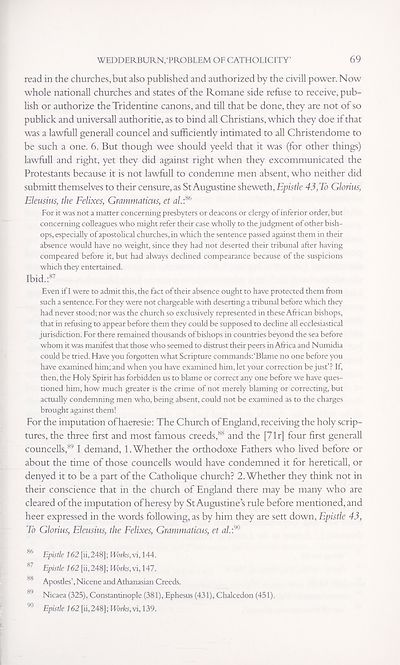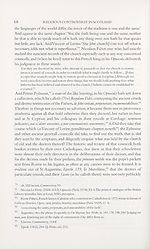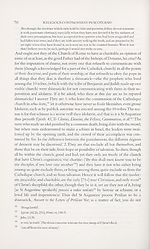Series 5 > Religious Controversy in Scotland 1625-1639
(84) Page 69
Download files
Complete book:
Individual page:
Thumbnail gallery: Grid view | List view

WEDDERBURN/PROBLEM OF CATHOLICITY’ 69
read in the churches, but also published and authorized by the civill power. Now
whole nationall churches and states of the Romane side refuse to receive, pub¬
lish or authorize the Tridentine canons, and till that be done, they are not of so
publick and universall authoritie, as to bind all Christians, which they doe if that
was a lawful! general! councel and sufficiently intimated to all Christendome to
be such a one. 6. But though wee should yeeld that it was (for other things)
lawful! and right, yet they did against right when they excommunicated the
Protestants because it is not lawfull to condemne men absent, who neither did
submitt themselves to their censure, as St Augustine sheweth, Epistle 43, To Glorius,
Eleusius, the Felixes, Grammaticus, et al.:86
For it was not a matter concerning presbyters or deacons or clergy of inferior order, but
concerning colleagues who might refer their case wholly to the judgment of other bish¬
ops, especially of apostolical churches, in which the sentence passed against them in their
absence would have no weight, since they had not deserted their tribunal after having
compeared before it, but had always declined compearance because of the suspicions
which they entertained.
Ibid.:87
Even if I were to admit this, the fact of their absence ought to have protected them from
such a sentence. For they were not chargeable with deserting a tribunal before which they
had never stood; nor was the church so exclusively represented in these African bishops,
that in refusing to appear before them they could be supposed to dechne all ecclesiastical
jurisdiction. For there remained thousands of bishops in countries beyond the sea before
whom it was manifest that those who seemed to distrust their peers in Africa and Numidia
could be tried. Have you forgotten what Scripture commands:‘Blame no one before you
have examined him; and when you have examined him, let your correction be just’? If,
then, the Holy Spirit has forbidden us to blame or correct any one before we have ques¬
tioned him, how much greater is the crime of not merely blaming or correcting, but
actually condemning men who, being absent, could not be examined as to the charges
brought against them!
For the imputation ofhaeresie: The Church of England, receiving the holy scrip¬
tures, the three first and most famous creeds,88 and the [71r] four first generall
councells,89 I demand, 1. Whether the orthodoxe Fathers who lived before or
about the time of those councells would have condemned it for heretical!, or
denyed it to be a part of the Catholique church? 2. Whether they think not in
their conscience that in the church of England there may be many who are
cleared of the imputation of heresy by St Augustine’s rule before mentioned, and
heer expressed in the words following, as by him they are sett down, Epistle 43,
To Glorius, Eleusius, the Felixes, Grammaticus, et al.:90
86 Epistle 162 [ii, 248]; Works, vi, 144.
87 Epistle 162 [ii, 248]; Works, vi,U7.
88 Aposdes’, Nicene and Athanasian Creeds.
89 Nicaea (325), Constantinople (381), Ephesus (431), Chalcedon (451).
90 Epistle 162 [ii, 248]; Works, vi, 139.
read in the churches, but also published and authorized by the civill power. Now
whole nationall churches and states of the Romane side refuse to receive, pub¬
lish or authorize the Tridentine canons, and till that be done, they are not of so
publick and universall authoritie, as to bind all Christians, which they doe if that
was a lawful! general! councel and sufficiently intimated to all Christendome to
be such a one. 6. But though wee should yeeld that it was (for other things)
lawful! and right, yet they did against right when they excommunicated the
Protestants because it is not lawfull to condemne men absent, who neither did
submitt themselves to their censure, as St Augustine sheweth, Epistle 43, To Glorius,
Eleusius, the Felixes, Grammaticus, et al.:86
For it was not a matter concerning presbyters or deacons or clergy of inferior order, but
concerning colleagues who might refer their case wholly to the judgment of other bish¬
ops, especially of apostolical churches, in which the sentence passed against them in their
absence would have no weight, since they had not deserted their tribunal after having
compeared before it, but had always declined compearance because of the suspicions
which they entertained.
Ibid.:87
Even if I were to admit this, the fact of their absence ought to have protected them from
such a sentence. For they were not chargeable with deserting a tribunal before which they
had never stood; nor was the church so exclusively represented in these African bishops,
that in refusing to appear before them they could be supposed to dechne all ecclesiastical
jurisdiction. For there remained thousands of bishops in countries beyond the sea before
whom it was manifest that those who seemed to distrust their peers in Africa and Numidia
could be tried. Have you forgotten what Scripture commands:‘Blame no one before you
have examined him; and when you have examined him, let your correction be just’? If,
then, the Holy Spirit has forbidden us to blame or correct any one before we have ques¬
tioned him, how much greater is the crime of not merely blaming or correcting, but
actually condemning men who, being absent, could not be examined as to the charges
brought against them!
For the imputation ofhaeresie: The Church of England, receiving the holy scrip¬
tures, the three first and most famous creeds,88 and the [71r] four first generall
councells,89 I demand, 1. Whether the orthodoxe Fathers who lived before or
about the time of those councells would have condemned it for heretical!, or
denyed it to be a part of the Catholique church? 2. Whether they think not in
their conscience that in the church of England there may be many who are
cleared of the imputation of heresy by St Augustine’s rule before mentioned, and
heer expressed in the words following, as by him they are sett down, Epistle 43,
To Glorius, Eleusius, the Felixes, Grammaticus, et al.:90
86 Epistle 162 [ii, 248]; Works, vi, 144.
87 Epistle 162 [ii, 248]; Works, vi,U7.
88 Aposdes’, Nicene and Athanasian Creeds.
89 Nicaea (325), Constantinople (381), Ephesus (431), Chalcedon (451).
90 Epistle 162 [ii, 248]; Works, vi, 139.
Set display mode to:
![]() Universal Viewer |
Universal Viewer | ![]() Mirador |
Large image | Transcription
Mirador |
Large image | Transcription
Images and transcriptions on this page, including medium image downloads, may be used under the Creative Commons Attribution 4.0 International Licence unless otherwise stated. ![]()
| Scottish History Society volumes > Series 5 > Religious Controversy in Scotland 1625-1639 > (84) Page 69 |
|---|
| Permanent URL | https://digital.nls.uk/127328973 |
|---|
| Description | Over 180 volumes, published by the Scottish History Society, containing original sources on Scotland's history and people. With a wide range of subjects, the books collectively cover all periods from the 12th to 20th centuries, and reflect changing trends in Scottish history. Sources are accompanied by scholarly interpretation, references and bibliographies. Volumes are usually published annually, and more digitised volumes will be added as they become available. |
|---|


